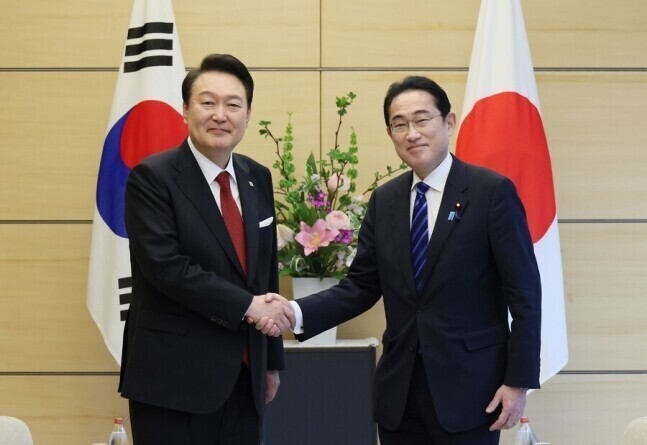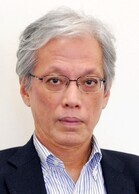hankyoreh
Links to other country sites 다른 나라 사이트 링크
[Column] How must Korea and Japan develop ties?


Japan has welcomed the fact that President Yoon Suk-yeol managed to put a political wrap on the “comfort women” issue during his visit to Japan and his meeting with Japanese Prime Minister Fumio Kishida on March 16.
The Japanese government, the ruling Liberal Democratic Party, and conservative media believe that the issue was settled in 1965 with the signing of a claims agreement between South Korea and Japan, so it is only natural that the South Korean government be the one to pay reparations.
I disagree with such a viewpoint. 1965 was during the Park Chung-hee dictatorship, and the treaty was not discussed liberally among the Korean people. It was not until the democratization of South Korea that the victims of forced mobilization began to make their voices heard. I think it is the moral obligation of the Japanese to compensate the victims of Japan’s wars, even if it may not be a legal obligation.
The only way to deal with this issue is to create a system where the Japanese government and Japanese companies contribute to a fund to compensate the victims, an example of which can be seen in Germany. Japan should contribute to the newly made foundation set up by the South Korean government. I hope to continue to speak out about these issues like this in Japan.
My biggest question throughout this entire process is, while it is a relief that Yoon did not push for Japan’s legal obligation to compensate, why did Kishida not respond to South Korea’s call for a sincere gesture of good faith? Kishida stated in a joint press conference after the summit that “the Japanese government inherits, as a whole, the positions of previous Cabinets on historical recognition, including the Japan-South Korea Joint Declaration of 1998.”
The positions of previous Cabinets on historical recognition means, as put forth in a statement by then-Prime Minister Tomiichi Murayama in 1995, to apologize and reflect on Japan’s colonial rule and aggression. Inheriting such positions is something that ought to happen. But did Kishida not have his own ideas to add to that?
In February 2022, US President Joe Biden issued a statement on behalf of the US government to apologize, 81 years later, for the US government’s forced internment of Japanese Americans during World War II by saying “The wrongful incarceration of 120,000 Americans of Japanese descent tore families apart. Men, women, and children were forced to abandon their homes, their jobs, their communities, their businesses, and their way of life.” He also Romanized a Japanese phrase to use as a vow — “nidoto nai yoni,” or “let it not happen again.” Biden’s apology moved not only Japanese Americans, but the Japanese as well.
Kishida has underscored that Japan will be an agent of freedom, democracy, and the rule of law in the international community at every given opportunity. If Japan really wants to respect the rule of law, it must sincerely apologize for the violations of human rights it has committed in the past.
Japan’s refusal to listen to the voices of victims while signing the 1965 treaty served to legitimize its violations of human rights and disregard the spirit of the law. If Kishida wants to defend the rule of law in the international community, he must not only condemn Russia’s war, but also confront his own country’s past violations of human rights.
2023 marks the 100th anniversary of the catastrophic Kanto earthquake. The events surrounding the massacre of Koreans in the wake of the earthquake raise the question of whether Japan is willing to face the sins of its past.
On Sept. 1, the anniversary of the earthquake, ceremonies were held to commemorate all the victims, as well as to mourn the slaughtered Koreans. Successive Tokyo governors have sent messages of condolence, including the late Shintaro Ishihara (one of Japan’s prominent far-right conservative politicians).
However, the current governor, Yuriko Koike, has not issued such a message since she took office. When asked about it at the Tokyo Metropolitan Assembly in February, she reiterated her previous stance that she would not comment on the massacre, saying “it should be left to historians to determine what are indisputable facts.”
The massacre is an indisputable fact. Koike’s comments are a highly political message that reinforces the historical revisionism that denies the existence of the massacre. On the 100th anniversary of the Kanto earthquake, Japan must once again face its past.
Please direct questions or comments to [english@hani.co.kr]

Editorial・opinion
![[Column] Life on our Trisolaris [Column] Life on our Trisolaris](https://flexible.img.hani.co.kr/flexible/normal/500/300/imgdb/original/2024/0505/4817148682278544.jpg) [Column] Life on our Trisolaris
[Column] Life on our Trisolaris![[Editorial] Penalties for airing allegations against Korea’s first lady endanger free press [Editorial] Penalties for airing allegations against Korea’s first lady endanger free press](https://flexible.img.hani.co.kr/flexible/normal/500/300/imgdb/original/2024/0502/1817146398095106.jpg) [Editorial] Penalties for airing allegations against Korea’s first lady endanger free press
[Editorial] Penalties for airing allegations against Korea’s first lady endanger free press- [Editorial] Yoon must halt procurement of SM-3 interceptor missiles
- [Guest essay] Maybe Korea’s rapid population decline is an opportunity, not a crisis
- [Column] Can Yoon steer diplomacy with Russia, China back on track?
- [Column] Season 2 of special prosecutor probe may be coming to Korea soon
- [Column] Park Geun-hye déjà vu in Yoon Suk-yeol
- [Editorial] New weight of N. Korea’s nuclear threats makes dialogue all the more urgent
- [Guest essay] The real reason Korea’s new right wants to dub Rhee a founding father
- [Column] ‘Choson’: Is it time we start referring to N. Korea in its own terms?
Most viewed articles
- 1New sex-ed guidelines forbid teaching about homosexuality
- 2OECD upgrades Korea’s growth forecast from 2.2% to 2.6%
- 3[Column] Life on our Trisolaris
- 4Months and months of overdue wages are pushing migrant workers in Korea into debt
- 560% of young Koreans see no need to have kids after marriage
- 6Presidential office warns of veto in response to opposition passing special counsel probe act
- 7Korean government’s compromise plan for medical reform swiftly rejected by doctors
- 8[Guest essay] Maybe Korea’s rapid population decline is an opportunity, not a crisis
- 9Is Japan about to snatch control of Line messenger from Korea’s Naver?
- 10Inside the law for a special counsel probe over a Korean Marine’s death